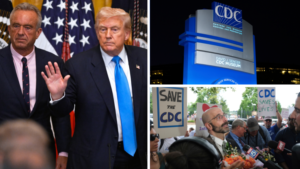Congress
Congress is set to receive the first batch of Epstein files. It’s not likely to quell the drama.
The Justice Department is expected on Friday to start handing the first batch of Jeffrey Epstein files over to Congress. But it may be a while before lawmakers get the information they want — if ever.
The DOJ is taking a piecemeal approach to transmitting documents to Capitol Hill, pursuant to a subpoena issued this month by the House Oversight and Government Reform Committee after Democrats on the panel forced the matter.
The committee, led by Kentucky Republican Rep. James Comer, anticipates receiving an initial tranche of files related to the convicted sex offender by the end of the day Aug. 22. Making these materials public, however, will be a slow, deliberative process.
That’s because House Oversight intends to coordinate with the Justice Department on taking steps to shield the names of the women who were victims of Epstein, who died by suicide in 2019, and information around ongoing criminal cases.
“The Committee intends to make the records public after thorough review to ensure all victims’ identification and child sexual abuse material are redacted,” said an Oversight Committee spokesperson, granted anonymity to share details about the panel’s internal activities. “The Committee will also consult with the DOJ to ensure any documents released do not negatively impact ongoing criminal cases and investigations.”
If the Justice Department follows precedent, both Democrats and Republicans on House Oversight would get access to the materials. While under a typical arrangement, the majority — in this case Republicans — would control its disclosure, either party could release the materials unilaterally.
Democrats, however, intend to review the files before releasing them publicly, according to a person familiar with Oversight Democrats’ planning, speaking on condition of anonymity to share internal party strategy.
The files they receive could include FBI reports of witness interviews; materials seized from the searches of Epstein’s vast properties in New York, the Virgin Islands, Palm Beach and New Mexico; and the affidavits used to gain permission from judges to execute those searches.
There are a variety of complicating factors to consider, among them the ongoing legal challenge that Ghislaine Maxwell, a longtime Epstein associate, is pursuing against her 20-year conviction for sex trafficking crimes. House Oversight previously subpoenaed Maxwell for testimony and is negotiating the conditions of the interview with her legal team. Maxwell, who was sentenced in 2021, is demanding that she be granted immunity from further criminal proceedings in exchange for her cooperation.
The plodding process is unlikely to satisfy demands for transparency from lawmakers on both sides of the aisle, though. And House GOP leaders shouldn’t expect to return from the August recess free from the drama that consumed them in July.
“After months of stonewalling, calling Epstein files a hoax, and telling people nothing but porn exists in their possession, the administration now admits the files exist, and agrees to release some of them,” Rep. Thomas Massie (R-Ky.) said in a social media post this week. “Americans want transparency though, not smoke and mirrors.”
Massie, with Rep. Ro Khanna (D-Calif.), has been leading the charge to force a floor vote on a resolution that would compel the release of the Epstein files, and the two men say they’ll follow through on plans when Congress returns to use procedural maneuvers to call the measure up without leadership’s consent.
The Massie-Khanna resolution would call for the materials to be made public with redactions only for the purposes of protecting names of victims, hiding sexually explicit content and in instances where ongoing legal cases could be compromised. In other words, the lawmakers want to guarantee the identities of Epstein’s associates, if applicable, are revealed.
Last month, Speaker Mike Johnson said Republicans should give the DOJ time to reveal the documents in a responsible manner that would respect the privacy of Epstein’s victims. However, President Donald Trump — who had ties to Epstein, a well-known financier — was also pushing to move past the issue after his allies had stoked conspiracy theories for years about what authorities were hiding.
Yet Massie, Khanna and allies would not budge from their stance that members must be allowed to vote to bring the files to light, disrupting the Rules Committee that tees up floor consideration for most legislation. Leaders opted to send their members home a few days ahead of schedule for the summer recess rather than stay in Washington to take politically uncomfortable votes.
Democrats are also signaling they won’t be satisfied by the DOJ’s game plan and will continue to make the issue a political headache for Republicans.
“Releasing the Epstein files in batches just continues this White House cover-up. The American people will not accept anything short of the full, unredacted Epstein files,” Rep. Robert Garcia, the top Democrat on the Oversight Committee, said in a statement. “We will keep pressing until the American people get the truth — every document, every fact, in full. The administration must comply with our subpoena, by law.”
Efforts to draw a wedge in the GOP over the Epstein files were taking place as far away as Texas this week, where Gene Wu, chair of the state’s House Democratic Caucus, offered an amendment to delay Republicans’ mid-decade redistricting efforts until after the release of Epstein materials.
Meanwhile, back in Washington, lawmakers will regroup on Capitol Hill on Sept. 2 with just four weeks left to avert a government shutdown, and there’s already concern in GOP leadership over the time the House could waste continuing to fight over perceived distractions.
“I’d really like to see this resolved, if possible, before we get back,” Rep. Virginia Foxx (R-Va.), chair of the House Rules Committee, told reporters this week. “We’re going to have a lot of work to do when we get back in September. I’ve already looked at my September calendar, and it looks pretty busy.”
Foxx, whose committee work was derailed by members’ efforts to force Epstein-related votes, called the saga “a tempest in a teapot.”
In February, the Department of Justice released what it called the “first phase” of documents related to the Epstein investigation, which has been a fixation of some of the president’s supporters. It has long been public that Trump — along with other prominent figures, like Bill Clinton — are referenced in documents previously released in court cases surrounding Epstein. But Trump is not accused of any wrongdoing linked to Epstein.
The real firestorm, however, began in earnest in early July, when the department quietly released a memo saying the federal government did not find evidence of a so-called Epstein “client list.” Conspiracists had long postulated that Epstein kept such a list of people with whom he trafficked young women, and that it was being hidden to protect the rich and powerful.
No additional disclosures would be forthcoming, the unsigned memo said, which quickly — and predictably — set off a complicated political quagmire for the president and the GOP amid accusations that the administration was reneging on its promise for transparency.
Trump, in an effort to quash the outrage, asked Attorney General Pam Bondi to seek the release of grand jury materials in the most recent investigations of Epstein and Maxwell in New York, as well as an earlier federal probe of Epstein in Florida. In recent weeks, all three judges assigned to resolve the unsealing requests rebuffed the administration, with the most recent rejection coming Wednesday.
The judges said the department hadn’t justified taking the unusual step of unsealing the secret files and that, in any event, most of material in the files had already been made public through Maxwell’s trial or other means.
Still, even if the grand jury transcripts and exhibits were made public, they represent a tiny fraction of the material the Justice Department possesses in the Epstein and Maxwell investigative files that are the subject of the congressional subpoena.
When the House Oversight Committee interviewed Trump’s former attorney general, Bill Barr, as part of its probe into the Epstein matter earlier this month, Barr told congressional investigators that he did not know why the documents were being withheld, according to a person familiar with his testimony and granted anonymity to describe the private conversation.
The lack of transparency around the process, however, might have to do with the fact that some grand jury materials may need court approval, Barr suggested, and that current policy prohibits the release of unsubstantiated information.
Ultimately, the House Oversight subpoena currently represents the best chance for bringing some information to light — and for the Trump administration to get limited details released to satisfy those clamoring for action.
Longstanding DOJ policies as well as a federal law — the Privacy Act of 1974 — limit disclosures about living individuals investigated for potential crimes. However, that law and those DOJ rules do not apply to Congress, which is generally free to ignore individuals’ pleas for discretion. DOJ has sometimes used that distinction to effectively make sensitive information public by transmitting it to Congress — with GOP and Democratic lawmakers then able to cherry pick what of the sensitive information they choose to share.
A DOJ spokesperson did not respond to a request for comment.
Erica Orden, Josh Gerstein and Jordain Carney contributed to this report.
Congress
White House declares $4.9B in foreign aid unilaterally canceled in end-run around Congress’ funding power
The White House budget office said Friday morning that President Donald Trump has canceled $4.9 billion in foreign aid by using a so-called pocket rescission — furthering the administration’s assault on Congress’ funding prerogatives.
The move raises tensions on Capitol Hill as lawmakers face an Oct. 1 deadline to avoid a government shutdown. Many lawmakers from both parties, as well as Congress’ top watchdog, view the maneuver as an illegal end-run around their “power of the purse.”
The Trump administration boldly embraced the strategy on Friday. “Congress can choose to vote to rescind or continue the funds — it doesn’t matter,” an official from the White House budget office said in a statement. “This approach is rare but not unprecedented.”
The White House is allowed to send Congress a clawbacks request and then withhold the cash for 45 days while lawmakers consider whether to approve, reject or ignore the proposal. Because there are less than 45 days left before the end of the fiscal year, Trump’s top budget officials — led by budget chief Russ Vought — argue that they can employ the so-called pocket rescission to withhold the funding until it lapses at month’s end, ensuring its cancellation regardless of what Congress decides.
The pocket rescission request was first reported by the New York Post.
Meredith Lee Hill contributed to this report.
Congress
Bondi, Patel to testify before Congress amid Epstein fallout
Two top Justice Department officials are expected to testify before the House Judiciary Committee in the coming weeks amid fallout over the administration’s handling of the Jeffrey Epstein case, according to two people granted anonymity to share scheduling information not yet public.
FBI director Kash Patel is set to give testimony Sept. 17, with attorney general Pam Bondi on tap to appear Oct. 9. Both have been invited as part of the Judiciary Committee’s general oversight work, and each will have an opportunity to outline some of the pieces of a crime bill President Donald Trump wants Hill Republicans to produce in the coming months.
But the hearings will likely focus most heavily on how the DOJ has maneuvered around the release of files related to the late, convicted sex offender.
Senior Republicans have continued over the August recess to press the Trump administration to unseal more Epstein documents after a mutiny over their release caused chaos in the GOP-controlled House, running the chamber aground before lawmakers left town early in late July.
DOJ started transmitting some of the so-called Epstein files last week in compliance with a subpoena from the House Oversight and Government Reform Committee. And Alex Acosta, President Donald Trump’s former labor secretary who singed off on Epstein’s previous plea deal as a then-U.S. attorney in Florida, will separately sit for a transcribed interview with the Oversight panel Sept. 19.
However, lawmakers otherwise have so far received scant new information during the month-long district work period, with members of both parties promising to continue to press the issue when the House is set to return to session next week.
Bondi has, in particular, been the subject of Republican consternation over allegedly withholding documents she at one point promised to reveal.
Congress
Mark Teixeira, former MLB All Star, kicks off Texas House campaign
Baseball star Mark Teixeira launched a campaign to fill an open Texas House seat Thursday, the latest celebrity athlete to dive into politics.
Teixeira is running as a Republican in a safe red seat being vacated by GOP Rep. Chip Roy. And he’s already appealing to President Donald Trump in search of a home run on the campaign trail.
“As a lifelong conservative who loves this country, I’m running for Congress to fight for the principles that make Texas and America great,” he wrote in a post on X. “It takes teamwork to win — I’m ready to help defend President Trump’s America First agenda, Texas families, and individual liberty.”
Teixeira was a superstar on the diamond, going yard 409 times in a career that spanned 14 seasons and saw him play for four big league outfits, including the Texas Rangers and New York Yankees. He last played in the 2016 season.
He reached baseball immortality when the Yankees won the World Series in 2009. He was included on the 2022 Hall of Fame ballot but failed to get enough votes from sportswriters to either get elected to the Hall or return to the ballot in future years.
Should he win the seat, he could be a major boon for Republicans in the Congressional Baseball Game, the annual charity event that pits Democrats against Republicans. The GOP has dominated the game in recent years, a gap that a former major leaguer would likely only widen.
Teixeira is leaning into his baseball bona fides.
“In Congress, he’ll bring the same grit, preparation, and competitive spirit that made him a champion in Major League Baseball to fight for Texas—and win,” reads his campaign website.
Roy, a Freedom Caucus member who has served in the House since 2019, is leaving Congress to run for the Texas attorney general post.
-
Uncategorized10 months ago
Bob Good to step down as Freedom Caucus chair this week
-

 The Josh Fourrier Show10 months ago
The Josh Fourrier Show10 months agoDOOMSDAY: Trump won, now what?
-

 Politics10 months ago
Politics10 months agoWhat 7 political experts will be watching at Tuesday’s debate
-

 Politics6 months ago
Politics6 months agoFormer ‘Squad’ members launching ‘Bowman and Bush’ YouTube show
-

 Politics10 months ago
Politics10 months agoHow Republicans could foil Harris’ Supreme Court plans if she’s elected
-

 The Dictatorship6 months ago
The Dictatorship6 months agoPete Hegseth’s tenure at the Pentagon goes from bad to worse
-
Economy10 months ago
Fed moves to protect weakening job market with bold rate cut
-

 Politics10 months ago
Politics10 months agoRFK Jr.’s bid to take himself off swing state ballots may scramble mail-in voting








